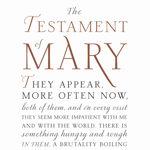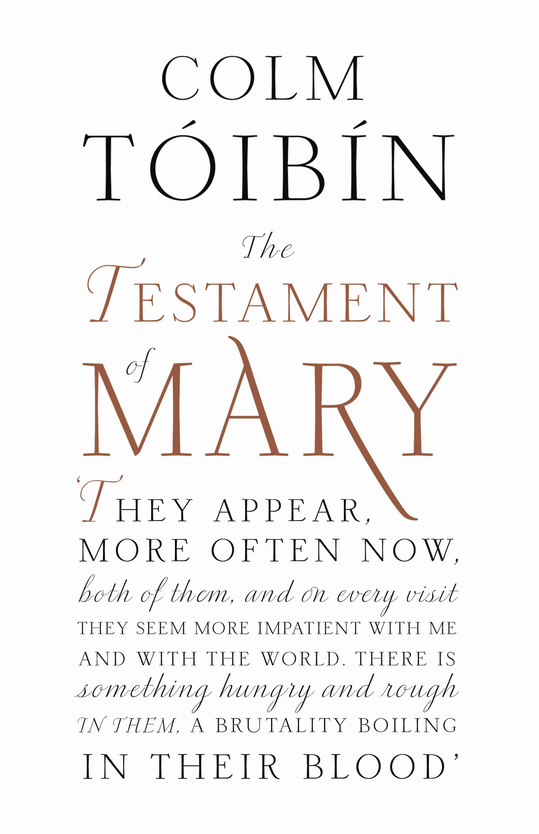John Lavin commends Colm Toibin’s The Testament of Mary, a philosophical and literary exploration of the story of Mary.

‘I don’t think the ecclesiastical people have any authority,’ Colm Tóibín recently told the Sydney Morning Herald. ‘If it had been some years ago, they would have leapt on it, but now they’ve got other things.’
And leapt on it they most certainly would have done because The Testament of Mary is told from the point of view of a Mary who believes that Jesus is possibly ‘out of his mind’ and who will not speak his name anymore because it is too associated with what he became, as opposed to the child that she raised. A Mary who is distrustful, almost to the point of active dislike, of the apostles, who appear boorish and at times even sinister – not least John, the man who comes to put words into her mouth and convince her that she is the Mother of God. Her life ends with her praying to Artemis, the many breasted fertility God and descending in her mind into a city like ‘an opal set in emerald.’ So it is indeed a reassuring sign of changing attitudes, especially, you would have to say in Tóibín’s native Ireland, that The Testament of Mary has so far attracted only literary praise and a complete absence of religious intolerance.
It is a book worthy of the highest critical praise, not only for its peerless literary style – which we have come to expect from Tóibín – but for its imaginative and philosophical reach. It is a profoundly intelligent book. Tóibín does not make any grand claims for it; he does not seek to say that this is the defining story of Mary but rather that this is as close and as honest an imagining of her that he, by flexing all of his considerable literary talents, has been able to achieve. And through that we see, perhaps more clearly than ever before, Tóibín’s own vision of the world, the vision which has informed darkly luminous works such as The Blackwater Lightship and The Empty Family. In The Testament of Mary, that vision, if anything, makes more sense. Because The Testament of Mary is very much in the style and tradition of a typical Tóibín novel or short story, in that it describes a world full of mystery marked by strange symbols; a world by no means devoid of love; but a world where, to all appearances at least, we are essentially alone. A world indeed where God does very probably not exist but where the idea of Him haunts the spaces we inhabit and the ideas that we formulate. A world where the best we can hope to manage is what Mary hopes she has been able to manage at the end of her life:
‘I wanted dreams to have their place, to let them belong to the night. And I wanted what happened, what I saw, what I did, to belong to the day. Until I died I hoped that I would live in full recognition of the two.’
This may as well also be the wish, or the daily incantation, made by the Irish people as they wake from the long dream that the Catholic Church has held them under. The wish to no longer be haunted by guilt for things over which they could have no control. The wish, indeed, to no longer feel guilty for being simply human. If Tóibín’s Mary seems reminiscent of the mothers who populate his fiction and, in particular, his story collection, Mothers and Sons, or reminiscent, perhaps, of a classic Ireland-representational female figure like Bridie in William Trevor’s ‘The Ballroom of Romance,’ then it is not through laziness but through the desire that his Mary should represent contemporary Ireland. In this book Tóibín – himself, of course, a lapsed Irish Catholic – has made his Mary represent Ireland, which has long identified itself with her virginity and her role as the eternal mother, in a new, utterly different way. He has given her the voice and soul of a wonderful, ordinary woman, made of flesh and blood. A woman who baulks at John’s suggestion that her son was conceived not out of human love but by the Immaculate Conception. It is, in some ways, an incantation on Tóibín’s part to help free the women of his country and elsewhere from the unrealistic and downright bizarre expectations that have been put upon them by the Catholic Church and others. Indeed, if, in his fiction, he has long been preoccupied with giving voice to mothers and housewives, then it is only the natural conclusion to give voice to the Mother of Christ. A woman largely silenced by history – our perception of whom, in Tóibín’s opinion, was largely manufactured by John.
Tóibín has said that the inspiration for the novella came in the first place from Tintoretto’s Crucifixion, which he chanced across when he was on holiday in Venice:
‘It’s very untidy and big. The crucifixion is as though a lot is going on at the time – the drama, fires lighting, a lot of noise – it’s a hugely noisy painting. And that painting really got me thinking about what it could have been like and then how come Matthew, Mark and Luke don’t have Mary at the crucifixion the same way as John does.’
It struck Tóibín that John had seen some Greek theatre and that it would have occurred to him that a story without a mother waiting at the Cross, weeping and taking her son’s body away to be buried, would have considerably less mythic impact. And so in Tóibín’s version Mary does not wait for her son’s body to be taken down from the cross, something which haunts her for the rest of her life. She does not wait because she cannot, because men working for the Pharisees, including a man known to be a strangler, are waiting to take her life as well. And so, human to the end, she slips away with John, both of them terrified for their own lives.
But twenty years later, in the safe house John has found for her in Ephesus, he does not want her to remember this, or any of the details about the terrifying atmosphere that surrounded the Crucifixion. He does not want her to remind him of the image she cannot get out of her head, of the man with a large angry caged bird and a sack full of live rabbits. In an image which recalls and rivals Tennessee Williams baby turtle-eating vultures turning the sky black, in Suddenly Last Summer, the man feeds the rabbits, ‘little bundles of fierce and terrorised energy’ to the bird:
The bird went for some part of their soft underbelly first, opening the rabbit until its guts spilled out, and then of course its eyes. …The cage became half full of half-dead wholly uneaten rabbits exuding strange squealing sounds. Twitching with old bursts of life. And the man’s face was all bright with energy, there was a glow from him, as he looked at the cage and then at the scene around him, almost smiling with dark delight, the sack not yet empty.
For Williams the black sky represents the face of God, which is a way of saying that God is simply nature in all its cruelty and indifference. You sense that for Tóibín, the face of God is the same.
‘I can tell you now, when you say he redeemed the world, I will say that it is not worth it. It was not worth it,’ Mary tells John at the books close, a woman who has seen her son killed in the most appalling way imaginable and has then lived for twenty years in fear and in hiding. She watches his old apostles try to construct a myth out of his and her lives and she wishes only, as any mother would, that he might have been spared. ‘How easily it might not have happened!’ she cries.
Colm Tóibín is a writer who is interested in in trying to discover what he can about the mystery of our existence through the medium of truth and nothing else. This exquisitely written, deeply imagined novella is in itself testament to the power and hope of this simple, if seldom followed, philosophy.
John Lavin is an avid contributor to Wales Arts Review.












